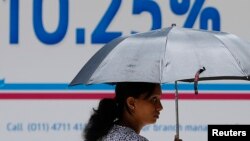Sri Lanka is seeking cheaper funding sources to replace billions of dollars in debt from Chinese banks, government officials said, as the six-month-old government distances itself from Beijing weeks before a general election.
The government is seeking to consolidate its power in the August 17 vote after reformer Maithripala Sirisena was elected president in January. The pro-China leader he ousted - Mahinda Rajapaksa - is staging a comeback bid.
Sirisena had suspended most Chinese-backed infrastructure projects started under Rajapaksa, who has denied allegations of corruption and overpricing in contract awards.
Sirisena's reformist coalition is in talks to replace about 70 percent of the more than $5 billion in debt from Chinese lenders with loans at cheaper interest rates and longer durations from other sources, two finance ministry officials involved in the negotiations said.
The move follows failed government efforts to negotiate more favorable terms with the Chinese banks, and the finance ministry is looking at options including borrowing from lenders in Japan, the United States or Europe, a top government official said.
"Money is there at a cheaper rate and for a longer tenure," he said.
Sri Lanka has sought to pursue a more global foreign policy since the new government was formed, breaking with the previous pursuit of close ties with China.
Finance Minister Ravi Karunanayake has been exploring ways his nation could borrow at lower rates after concluding from a trip to Japan this month that loans could be obtained for between 0.1 percent and 0.2 percent, a senior finance ministry official said.
Sri Lanka's government has 16 ongoing Chinese-backed infrastructure projects which depend on $4 billion in borrowing from the Export-Import Bank of China (Exim Bank) and the rates of interest are between 2.5 percent and 9 percent, finance ministry data shows.
Chinese officials have said the rates of interest are only 2 percent. But the data shows there are extra fees that add to cost the servicing the loan.
The Chinese embassy in Colombo said it was unaware of the government's move to replace the loans. Embassy officials had earlier told Reuters that the government can't renegotiate the loan terms.
The August 17 poll will likely see a battle between the current Prime Minister Ranil Wickremesinghe and Rajapaksa, who helped crush a 26-year insurgency against Tamil Tiger rebels in 2009 and who retains a strong following among the electorate.
Allies say if Rajapaksa comes to power, he would immediately resume Chinese projects suspended by the Sirisena government.








